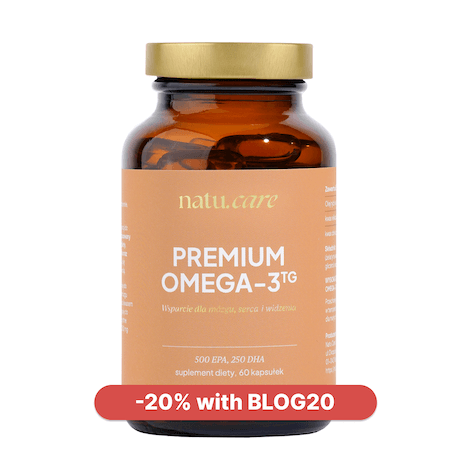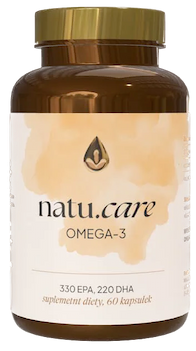- Home
- Omega acids
- DHA in pregnancy
DHA acid in pregnancy: how much to take and when to start supplementation?
Find out why you should supplement DHA acid during pregnancy and breastfeeding.


Learn more about our editorial process
.

Learn more about our editorial process
.

Learn more about our editorial process
.

Learn more about our editorial process
.
Why you can trust us
Articles on Natu.Care are written based on scientific research, data from government websites and other reliable sources. The texts are written in cooperation with doctors, nutritionists and other health and beauty experts. Articles are reviewed before publication and during significant updates.
.Learn more about our editorial process
.Information about advertisements
Content on Natu.Care may contain links to products from the sale of which we may receive a commission. When creating content, we adhere to high editorial standards and take care to be objective about the products discussed. The presence of affiliate links is not dictated by our partners, and we select the products we review ourselves completely independently.
.Learn more about our terms and Conditions
.The fact that folic acid needs to be supplemented during pregnancy is probably already known to every mum-to-be. However, there is one more ingredient that is worth taking care of during this special period.
Docosahexaenoic acid, or DHA, is one of the three most important omega-3 fatty acids, and its supplementation is recommended for both expectant and breastfeeding mothers.
From this article you will learn:
- What DHA acid is and why it is important for pregnant women. .
- How much DHA acid to take during pregnancy and when to start. .
- What are the best DHA supplements and can you overdose.
- What are the best DHA supplements and can you overdose?
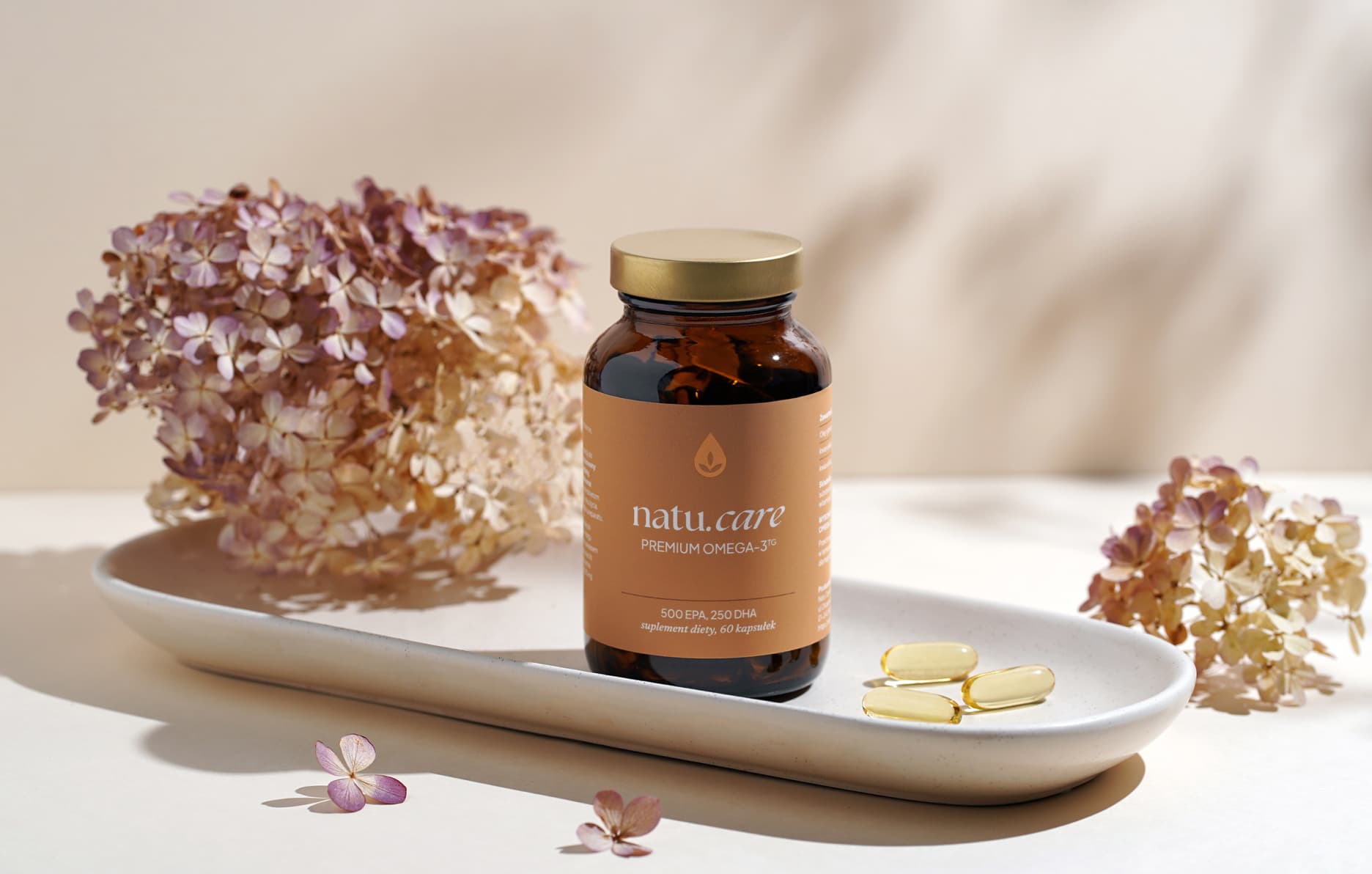
Sprawdź, za co pokochały go tysiące klientek Natu.Care Premium Omega-3ᵀᴳ -15% z kodem BLOG15
Natu.Care Omega-3ᵀᴳ Premium
Natu.Care Omega-3ᵀᴳ Premium dla zdrowia serca, mózgu i odporności. Najlepsza przyswajalność. Optymalna dawka 750 mg. Przebadana przez niezależne laboratorium.
Zobacz więcej
Produkt ma super skład, transparentną etykietę i co dla mnie jest ważne – małe kapsułki do połknięcia. Nie ma też nieprzyjemnego efektu odbijania rybą, który miałam spożywając inne produkty. Widzę znaczną poprawę odporności. Polecam!@Kasia P.
See also:
.
- DHA acid
- EPA acid
- ALA acid .
- Omega-3 fatty acids
- Omega-6 fatty acids
- Omega-9 fatty acids
- Folic acid
- triglycerides of omega-3 fatty acids .
- Best supplements with omega-3 fatty acids
- Best omega-3 fatty acids for kids
What is DHA acid?
.
DHA acid, or docosahexaenoic acid, is one of the key components of cell membranes in your body. It is an essential polyunsaturated fatty acid that belongs to the group of omega-3 acids. DHA is particularly important for the proper functioning of the nervous system, brain and eyes.
DHA acid has several important functions in your bodyand:
.
- .
- Promotes brain health -This acid is particularly important for brain development in infants and young children, but is also essential for proper brain function in adults.
- Cares for eye health - DHA is an essential component of the retina. Therefore, its deficiency can lead to vision problems.
- Prevents inflammation - DHA can help reduce inflammation in the body, which can be helpful in the course of many chronic diseases.
Why is DHA acid important during pregnancy?
.
When you are expecting the birth of your baby, one of the most important aspects you should take care of is your health and proper nutrition. In particular, it is worth taking care of the right amount of intracellular fatty acids, such as DHA acid.
The most important reason why DHA acid plays such an important role during pregnancy is its effect on the development of the brain and eyes of the foetus. DHA supports the normal development of the baby's brain in the womb and also after birth. It is also essential for the proper formation of the retina, which translates into the ability to seeand.
DHA not only benefits the baby's development, but also the mother's health - it can help prevent postnatal depression, among other things. Studies show that low levels of DHA may be associated with a higher risk of this condition. DHA acid also has the potential to reduce the risk of premature birthand.
A 2018 study suggests that taking DHA in the second half of pregnancy may minimise the risk of low birth weight in newbornsand.
.
Additionally, a proper supply of DHA during pregnancy prevents preterm birth..

Julia SkrajdaDietitian
.An interesting, multi-stage study from 2003 tested the effect of omega-3 fatty acid supplementation (including DHA acid) on mental development. Women at 18 weeks gestation were divided into two groups. One took corn oil (control group), the other oil with omega-3 fatty acids. The participants were to continue supplementation also during breastfeeding (for 3 months).
The final stage of the study tested the mental performance of children whose mothers took omega-3s and corn oil after they reached the age of four. According to the study, children of women supplementing with omega-3 during pregnancy and while breastfeeding scored better on an IQ testand.
Best DHA acid supplements for pregnant women
.
These dietary supplements are suitable for pregnant and lactating women. However, always remember to consult your healthcare professional before starting any supplementation. Let your health and the health of your baby always be a priority.
Product description
The dietary supplement contains omega-3ᵀᴳ, or omega-3 acids in the form of trójglyceridesów. Scientific studies suggest that this form of fatty acidsós up to 2 times better absorbed than the estersós present in many dietary supplements on the market. This means that you are assured of their effectiveness and of supplying yourself with valuable omega acids.
Fatty acids omega-3 are derived from wild anchovy oil. It is a rich source of healthy fats that are essential for the health of the cardiovascular, immune and nervous systems, as well as the proper function of vision, joints muscles.
Scientific research suggests that wild anchovies are a good source of healthy fats.
Scientific research also suggests that an adequate intake of omega-3 fatty acidsós protects against and supports the treatment of depression and anxiety disorders. In addition, omega-3s influence the hydration and appearance of the skinóry and support healthy sleep.
.
The formula contains a total of 750 mg of EPA+DHA acidsós, which is three times higher than the recommended minimum of 250 mg for the Polish population. Omega-3 TG Premium has studies indicating that its TOTOX is 9, which is a very good result.
Supplementation of omega-3 fatty acidsóis recommended for anyone who does not eat 1–2 portions (approximately 300 g) of oily fish per week. Children during growth, seniors, physically active people, vegans and vegetarians, as well as patients undergoing cardiovascular treatment and prevention of heart disease also have an increased need.
Pros and cons
The dietary supplement contains omega-3ᵀᴳ, or omega-3 acids in the form of trójglyceridesów. Scientific studies suggest that this form of fatty acidsós up to 2 times better absorbed than the estersós present in many dietary supplements on the market. This means that you are assured of their effectiveness and of supplying yourself with valuable omega acids.
Fatty acids omega-3 are derived from wild anchovy oil. It is a rich source of healthy fats that are essential for the health of the cardiovascular, immune and nervous systems, as well as the proper function of vision, joints muscles.
Scientific research suggests that wild anchovies are a good source of healthy fats.
Scientific research also suggests that an adequate intake of omega-3 fatty acidsós protects against and supports the treatment of depression and anxiety disorders. In addition, omega-3s influence the hydration and appearance of the skinóry and support healthy sleep.
.
The formula contains a total of 750 mg of EPA+DHA acidsós, which is three times higher than the recommended minimum of 250 mg for the Polish population. Omega-3 TG Premium has studies indicating that its TOTOX is 9, which is a very good result.
Supplementation of omega-3 fatty acidsóis recommended for anyone who does not eat 1–2 portions (approximately 300 g) of oily fish per week. Children during growth, seniors, physically active people, vegans and vegetarians, as well as patients undergoing cardiovascular treatment and prevention of heart disease also have an increased need.
Additional information
The dietary supplement contains omega-3ᵀᴳ, or omega-3 acids in the form of trójglyceridesów. Scientific studies suggest that this form of fatty acidsós up to 2 times better absorbed than the estersós present in many dietary supplements on the market. This means that you are assured of their effectiveness and of supplying yourself with valuable omega acids.
Fatty acids omega-3 are derived from wild anchovy oil. It is a rich source of healthy fats that are essential for the health of the cardiovascular, immune and nervous systems, as well as the proper function of vision, joints muscles.
Scientific research suggests that wild anchovies are a good source of healthy fats.
Scientific research also suggests that an adequate intake of omega-3 fatty acidsós protects against and supports the treatment of depression and anxiety disorders. In addition, omega-3s influence the hydration and appearance of the skinóry and support healthy sleep.
.
The formula contains a total of 750 mg of EPA+DHA acidsós, which is three times higher than the recommended minimum of 250 mg for the Polish population. Omega-3 TG Premium has studies indicating that its TOTOX is 9, which is a very good result.
Supplementation of omega-3 fatty acidsóis recommended for anyone who does not eat 1–2 portions (approximately 300 g) of oily fish per week. Children during growth, seniors, physically active people, vegans and vegetarians, as well as patients undergoing cardiovascular treatment and prevention of heart disease also have an increased need.
Expert opinion
The dietary supplement contains omega-3ᵀᴳ, or omega-3 acids in the form of trójglyceridesów. Scientific studies suggest that this form of fatty acidsós up to 2 times better absorbed than the estersós present in many dietary supplements on the market. This means that you are assured of their effectiveness and of supplying yourself with valuable omega acids.
Fatty acids omega-3 are derived from wild anchovy oil. It is a rich source of healthy fats that are essential for the health of the cardiovascular, immune and nervous systems, as well as the proper function of vision, joints muscles.
Scientific research suggests that wild anchovies are a good source of healthy fats.
Scientific research also suggests that an adequate intake of omega-3 fatty acidsós protects against and supports the treatment of depression and anxiety disorders. In addition, omega-3s influence the hydration and appearance of the skinóry and support healthy sleep.
.
The formula contains a total of 750 mg of EPA+DHA acidsós, which is three times higher than the recommended minimum of 250 mg for the Polish population. Omega-3 TG Premium has studies indicating that its TOTOX is 9, which is a very good result.
Supplementation of omega-3 fatty acidsóis recommended for anyone who does not eat 1–2 portions (approximately 300 g) of oily fish per week. Children during growth, seniors, physically active people, vegans and vegetarians, as well as patients undergoing cardiovascular treatment and prevention of heart disease also have an increased need.
Product description
The dietary supplement contains high-quality fatty acids omega-3 from anchovy oil. It is a naturally rich source of healthy fats that are essential for cardiovascular, immune and nervous system health, as well as proper function of eyesight, joints muscles.
Scientific research also suggests that an adequate intake of omega-3 fatty acidsós protects against and supports the treatment of depression and anxiety disorders. In addition, omega-3s influence the hydration and appearance of the skinóry and support healthy sleep.
.
The dietary supplement contains 550 mg EPA+DHA per daily serving. This is more than double the official recommendations for the Polish population, whichóre suggesting an intake of at least 250 mg per day.
Supplementation of EPA+DHA is a good way to support healthy sleep.
Supplementation with omega-3 fatty acidsós is advisable if you do not consume 1–2 portions (approx. 300 g) of oily fish per week. There is also an increased need for physically active people, vegans and vegetarians, seniors, children during growth spurts and patients undergoing cardiovascular treatment and prevention of heart disease.
Pros and cons
The dietary supplement contains high-quality fatty acids omega-3 from anchovy oil. It is a naturally rich source of healthy fats that are essential for cardiovascular, immune and nervous system health, as well as proper function of eyesight, joints muscles.
Scientific research also suggests that an adequate intake of omega-3 fatty acidsós protects against and supports the treatment of depression and anxiety disorders. In addition, omega-3s influence the hydration and appearance of the skinóry and support healthy sleep.
.
The dietary supplement contains 550 mg EPA+DHA per daily serving. This is more than double the official recommendations for the Polish population, whichóre suggesting an intake of at least 250 mg per day.
Supplementation of EPA+DHA is a good way to support healthy sleep.
Supplementation with omega-3 fatty acidsós is advisable if you do not consume 1–2 portions (approx. 300 g) of oily fish per week. There is also an increased need for physically active people, vegans and vegetarians, seniors, children during growth spurts and patients undergoing cardiovascular treatment and prevention of heart disease.
Additional information
The dietary supplement contains high-quality fatty acids omega-3 from anchovy oil. It is a naturally rich source of healthy fats that are essential for cardiovascular, immune and nervous system health, as well as proper function of eyesight, joints muscles.
Scientific research also suggests that an adequate intake of omega-3 fatty acidsós protects against and supports the treatment of depression and anxiety disorders. In addition, omega-3s influence the hydration and appearance of the skinóry and support healthy sleep.
.
The dietary supplement contains 550 mg EPA+DHA per daily serving. This is more than double the official recommendations for the Polish population, whichóre suggesting an intake of at least 250 mg per day.
Supplementation of EPA+DHA is a good way to support healthy sleep.
Supplementation with omega-3 fatty acidsós is advisable if you do not consume 1–2 portions (approx. 300 g) of oily fish per week. There is also an increased need for physically active people, vegans and vegetarians, seniors, children during growth spurts and patients undergoing cardiovascular treatment and prevention of heart disease.
Expert opinion
The dietary supplement contains high-quality fatty acids omega-3 from anchovy oil. It is a naturally rich source of healthy fats that are essential for cardiovascular, immune and nervous system health, as well as proper function of eyesight, joints muscles.
Scientific research also suggests that an adequate intake of omega-3 fatty acidsós protects against and supports the treatment of depression and anxiety disorders. In addition, omega-3s influence the hydration and appearance of the skinóry and support healthy sleep.
.
The dietary supplement contains 550 mg EPA+DHA per daily serving. This is more than double the official recommendations for the Polish population, whichóre suggesting an intake of at least 250 mg per day.
Supplementation of EPA+DHA is a good way to support healthy sleep.
Supplementation with omega-3 fatty acidsós is advisable if you do not consume 1–2 portions (approx. 300 g) of oily fish per week. There is also an increased need for physically active people, vegans and vegetarians, seniors, children during growth spurts and patients undergoing cardiovascular treatment and prevention of heart disease.
ALLNUTRITION Omega 3 Strong
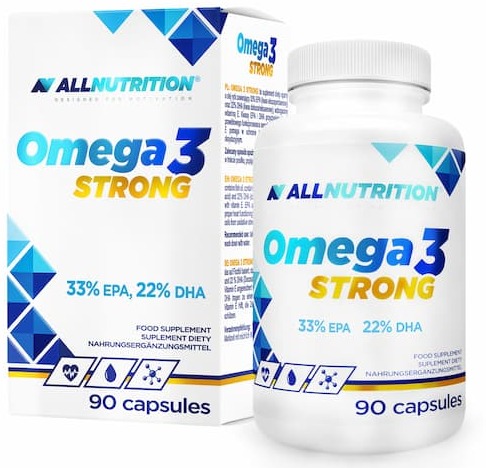
- Content omega-3 acids: 550 mg (DHA 220 mg + EPA 330 mg)
- Additional active ingredients: vitamin E
- Form: capsules .
- Dose: 1 capsule per day .
- Sufficient for: 90 days .
Product description
A dietary supplement with a solid portion of DHA and EPA – valuable for health and well-being omega-3 acidsós. Indicated especially for people on a plant-based diet, physically active people and seniors.
.The sourceóof omega-3 acids in this preparation is fish oil.
.Pros and cons
A dietary supplement with a solid portion of DHA and EPA – valuable for health and well-being omega-3 acidsós. Indicated especially for people on a plant-based diet, physically active people and seniors.
.The sourceóof omega-3 acids in this preparation is fish oil.
.Additional information
A dietary supplement with a solid portion of DHA and EPA – valuable for health and well-being omega-3 acidsós. Indicated especially for people on a plant-based diet, physically active people and seniors.
.The sourceóof omega-3 acids in this preparation is fish oil.
.User review
A dietary supplement with a solid portion of DHA and EPA – valuable for health and well-being omega-3 acidsós. Indicated especially for people on a plant-based diet, physically active people and seniors.
.The sourceóof omega-3 acids in this preparation is fish oil.
.Solgar Omega 3-6-9
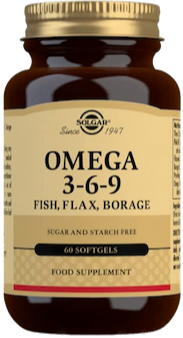
- Content of omega acids:.
- Omega-3 fatty acids.
- Omega-3 fatty acids
- alpha-linolenic acid (ALA) – 585 mg
.- eicosapentaenoic acid (EPA) – 344 mg
- docosahexaenoic acid (DHA) – 221 mg
.
- Omega-3 fatty acids
- Omega-6 fatty acids.
- linoleic acid (LA) – 598 mg .
- gamma-linolenic acid (GLA) – 274 mg .
- Omega-9 fatty acids.
- Oleic acid – 325 mg .
- Omega-3 fatty acids.
- Source of omega acids: fish oil from anchovies, mackerel, sardines, linseed oil, cucumber oil .
- Form: capsules .
- Packaging: 60 capsules .
- Daily allowance:3 capsules per day .
- Sufficient for: 20 days .
Product description
A combination of omega 3-6-9 fatty acidsós derived from fish and plants. The dietary supplement supplements essential omega fatty acids, whichóre needed for the proper functioning of many systemsóorgansóin the body.
Pros and cons
A combination of omega 3-6-9 fatty acidsós derived from fish and plants. The dietary supplement supplements essential omega fatty acids, whichóre needed for the proper functioning of many systemsóorgansóin the body.
Additional information
A combination of omega 3-6-9 fatty acidsós derived from fish and plants. The dietary supplement supplements essential omega fatty acids, whichóre needed for the proper functioning of many systemsóorgansóin the body.
A combination of omega 3-6-9 fatty acidsós derived from fish and plants. The dietary supplement supplements essential omega fatty acids, whichóre needed for the proper functioning of many systemsóorgansóin the body.
Omega + Vitamin D3 800 IU for children
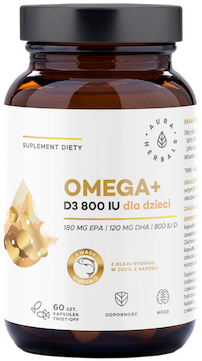
- Content of omega-3 fatty acids: 300 mg (180 mg EPA + 120 mg DHA)
- .
- Additional active ingredients: vitamin D3
- Form: twist-off capsules
- .
- Dose: 1 capsule per day
- .
- Sufficient for: 60 days
- .
Product description
Omega-3 acids for children with added vitamin D3 in good doses. The formula fills the daily requirement of EPA and DHA and vitamin D for children aged 2–18 years.
The Ministry of Health recommends supplementation with vitamin D3. In turn, omega-3 fatty acids are also crucial for the youngest.
The dietary supplement from Aura Herbals supports mós brain function, proper vision and immune system function.
The omega-3 fatty acids are derived from fish oil sourced from anchovies.
Pros and cons
Omega-3 acids for children with added vitamin D3 in good doses. The formula fills the daily requirement of EPA and DHA and vitamin D for children aged 2–18 years.
The Ministry of Health recommends supplementation with vitamin D3. In turn, omega-3 fatty acids are also crucial for the youngest.
The dietary supplement from Aura Herbals supports mós brain function, proper vision and immune system function.
The omega-3 fatty acids are derived from fish oil sourced from anchovies.
Additional information
Omega-3 acids for children with added vitamin D3 in good doses. The formula fills the daily requirement of EPA and DHA and vitamin D for children aged 2–18 years.
The Ministry of Health recommends supplementation with vitamin D3. In turn, omega-3 fatty acids are also crucial for the youngest.
The dietary supplement from Aura Herbals supports mós brain function, proper vision and immune system function.
The omega-3 fatty acids are derived from fish oil sourced from anchovies.
User review
Omega-3 acids for children with added vitamin D3 in good doses. The formula fills the daily requirement of EPA and DHA and vitamin D for children aged 2–18 years.
The Ministry of Health recommends supplementation with vitamin D3. In turn, omega-3 fatty acids are also crucial for the youngest.
The dietary supplement from Aura Herbals supports mós brain function, proper vision and immune system function.
The omega-3 fatty acids are derived from fish oil sourced from anchovies.
See also: Omega-3 fatty acids - which ones to choose?
.
How much DHA should you take while pregnant?
.
Before getting into specifics, let's start by saying that DHA acid supplementation during pregnancy should be consulted with your doctor. It is also a good idea to do blood tests to determine the concentration of omega-3 fatty acids in the body and go to a specialist with the results.
Both during the period when you are preparing for pregnancy and during pregnancy, experts recommend taking DHA acid. However, its daily intake should depend on your diet. If your diet is rich in fish and seafood, experts advise consuming 200 mg DHA acid per dayand.
However, if you don't eat fish or eat too little fish you can supplement 400 mg DHA acid dailyand. But how do you know if you're eating the right amount of fish? If they're on your plate at least 1-2 times a week (i.e. you're eating around 300g a week) - you're good.
See also: Omega-3: best sources in the diet
Interesting fact
.If your pregnancy is at risk of preterm birth, your doctor may recommend DHA acid supplementation at up to 1,000 mg per dayand.
.
DHA acid is also worth taking during breastfeeding, as the only source of this substance for your baby is your milkand.
.
DHA in pregnancy: from when to supplement it?
.
With DHA acid supplementation it is similar to taking folic acid: it is best to start even before you get pregnant, i.e. at the time you start planning your pregnancy. You can successfully continue to consume DHA acid throughout your pregnancy and lactation.
If this is not possible, start taking DHA acid from the stage of pregnancy you are currentlyand.
.
Is it possible to overdose on DHA during pregnancy?
.
As with any active substance, DHA acid can also be overdosed. Taking too high a daily dose can lead to unpleasant discomforts, such asand:
- bleeding gums, .
- nose bleeding, .
- diarrhoea, .
- nausea, .
- excessive lowering of blood pressure, .
In addition, in people with diabetes, too high doses of DHA acid may cause blood sugar levels to rise.
Additionally, too high a supply of DHA will reduce the absorption of EPA..

Julia SkrajdaDietitian
..
For supplementation to be safe and to benefit you as much as possible, always follow your doctor's recommendations as to dosage or the manufacturer's guidelines for a particular product.
See also:
- EPA + DHA acids. What do they help with? .
- Omega-3 medicine, not a supplement
- Symptoms of omega-3 fatty acid deficiency
- Best omega-3s in tablets
- Best sources of omega-3 in the diet
- Omega-3 in the diet of athletes
Summary
.
- DHA acid is a polyunsaturated fatty acid found in the cells of the body.
- DHA is a polyunsaturated fatty acid found in the cells of the body.
- His primary function during pregnancy is to promote the normal development of the fetal nervous system.
- DHA is a fatty acid found in the cells of the body.
- DHA acid also influences the formation of eye structures and later on supports the sense of sight. .
- The recommended daily intake of DHA acid for pregnant women depends, among other things, on the amount of fish consumed. .
- DHA acid is best started in supplementation during the planning period of pregnancy and continued throughout pregnancy, as well as during lactation.
FAQ
.Is it necessary to take DHA during pregnancy?
.It is worth taking DHA acid during pregnancy. Docosahexaenoic acid is an essential part of an expectant mother's diet as it supports the development of the baby's brain and vision. The recommended dose is at least 200 mg of DHA per day.
You can find it in oily marine fish such as salmon, mackerel and sardines. However, if you are unable to get enough DHA through diet, consider supplementation. When choosing a supplement, pay attention to its quality - it should be free of heavy metals.
Are omega-3 and DHA the same thing?
.No, Omega-3 and DHA are not the same thing. Omega-3s are a group of polyunsaturated fatty acids that include EPA (eicosapentaenoic acid), DHA (docosahexaenoic acid) and ALA (alpha-lipoic acid). DHA is therefore one type of omega-3 fatty acid.
DHA is crucial for the proper functioning of the brain and eyes. It is found in large quantities in brain tissue and the retina. EPA, on the other hand, is important for heart and cardiovascular health. You can find it in oily marine fish such as salmon and sardines. ALA is found in nuts, seeds and vegetable oils, among others. Ensure a balanced diet that provides all types of Omega-3 fatty acids.
How much DHA to take in the second trimester of pregnancy?
.In the second trimester as throughout pregnancy, it is recommended to take at least 200 mg DHA acid per day. If your diet is poor in fish, your daily intake of DHA acid should be around 400 mg.
Is DHA a vitamin D?
.No, DHA (docosahexaenoic acid) it is not vitamin D. DHA is an omega-3 polyunsaturated fatty acid, crucial for proper brain and eye function. Vitamin D, on the other hand, also known as the 'sunshine vitamin', is essential for the proper functioning of the immune system and healthy bones, among other things.
DHA can be found in oily marine fish such as salmon, mackerel and sardines. Vitamin D, on the other hand, you can make during sun exposure and from products such as oily fish, eggs and liver. Ensure a balanced diet to provide your body with both these nutrients.
How to check your DHA levels.
Test your DHA levels by taking a proper blood test - the cost is around £200. Find a laboratory that offers this test - it is often part of an analysis of a wider fatty acid profile. Make an appointment to have a blood sample taken. The results should show the concentration of DHA in erythrocytes, which is a good indicator of long-term DHA intake.
This test is particularly important for people on vegan or vegetarian diets, who may have low DHA levels due to lack of fatty fish consumption. Once you have your results, consult your doctor or nutritionist to interpret the results and adjust your diet or supplementation if necessary.
What does DHA mean?
.DHA is docosahexaenoic acid, a polyunsaturated fatty acid omega-3. It is mainly found in oily marine fish such as salmon and sardines. DHA is crucial for brain and eye health. Consume it regularly, especially if you are pregnant, breastfeeding or on a diet vegan diet.
DHA is also available in the form of dietary supplements, which is particularly important for people who do not eat fish. Choose high-quality supplements that are free from heavy metal contamination, such as Natu.Care Premium Omega-3 TG. DHA is essential for the body to function properly, so it is important to consume it regularly.
Are tranium and DHA the same thing?
.No, cod liver oil and DHA (docosahexaenoic acid) are not the same thing, although they are related. Tran is fish oil, which contains polyunsaturated omega-3 fatty acids, including DHA and EPA (eicosapentaenoic acid). DHA, on the other hand, is a specific fatty acid in the omega-3 group.
You can consume cod liver oil to provide your body with DHA and EPA. DHA is crucial for brain and eye function, while EPA supports the cardiovascular system.
DHA is a key fatty acid for brain and eye function, while EPA supports the cardiovascular system.
.
Sources
.See all
.Anderson, G. J., Connor, W. E., & Corliss, J. D. (1990). Docosahexaenoic Acid Is the Preferred Dietary n-3 Fatty Acid for the Development of the Brain and Retina. Pediatric Research, 27(1), Article 1. https://doi.org/10.1203/00006450-199001000-00023
Carlson, S. E., Gajewski, B. J., Alhayek, S., Colombo, J., Kerling, E. H., & Gustafson, K. M. (2018). Dose-response relationship between docosahexaenoic acid (DHA) intake and lower rates of early preterm birth, low birth weight and very low birth weight. Prostaglandins, Leukotrienes and Essential Fatty Acids, 138, 1-5. https://doi.org/10.1016/j.plefa.2018.09.002
Helland, I. B., Smith, L., Saarem, K., Saugstad, O. D., & Drevon, C. A. (2003). Maternal Supplementation With Very-Long-Chain n-3 Fatty Acids During Pregnancy and Lactation Augments Children's IQ at 4 Years of Age. Pediatrics, 111(1), e39-e44. https://doi.org/10.1542/peds.111.1.e39
Horrocks, L. A., & Yeo, Y. K. (1999a). Health benefits of docosahexaenoic acid (DHA). Pharmacological Research, 40(3), 211-225. https://doi.org/10.1006/phrs.1999.0495
Horrocks, L. A., & Yeo, Y. K. (1999b). HEALTH BENEFITS OF DOCOSAHEXAENOIC ACID (DHA). Pharmacological Research, 40(3), 211-225. https://doi.org/10.1006/phrs.1999.0495
Jarosz, Prof Dr M. (2020, December 3). Nutrition standards 2020. National Center for Nutrition Education. https://ncez.pzh.gov.pl/abc-zywienia/normy-zywienia-2020/
Mallick, R., Basak, S., & Duttaroy, A. K. (2019). Docosahexaenoic acid,22:6n-3: Its roles in the structure and function of the brain. International Journal of Developmental Neuroscience: The Official Journal of the International Society for Developmental Neuroscience, 79, 21-31. https://doi.org/10.1016/j.ijdevneu.2019.10.004
Marine Oils. (2006). In Drugs and Lactation Database (LactMed®). National Institute of Child Health and Human Development. http://www.ncbi.nlm.nih.gov/books/NBK501898/
Simopoulos, A. P. (2009). Evolutionary Aspects of the Dietary Omega-6:Omega-3 Fatty Acid Ratio: Medical Implications. https://doi.org/10.1159/000235706
Tai, E. K. K., Wang, X. B., & Chen, Z.-Y. (2013). An update on adding docosahexaenoic acid (DHA) and arachidonic acid (AA) to baby formula. Food & Function, 4(12), 1767-1775. https://doi.org/10.1039/C3FO60298B
Uauy, R., Mena, P., & Rojas, C. (2000). Essential fatty acids in early life: Structural and functional role. Proceedings of the Nutrition Society, 59(1), 3-15. https://doi.org/10.1017/S0029665100000021
Wawryszuk, N. (2023). Omega acids. Everything you need to know. (B. Turczynski, Ed.; 1st ed.). Natu.Care. https://books.google.com/books?vid=9788396887818
.Yelland, L. N., Gajewski, B. J., Colombo, J., Gibson, R. A., Makrides, M., & Carlson, S. E. (2016). Predicting the effect of maternal docosahexaenoic acid (DHA) supplementation to reduce early preterm birth in Australia and the United States using results of within country randomized controlled trials. Prostaglandins, Leukotrienes and Essential Fatty Acids, 112, 44-49. https://doi.org/10.1016/j.plefa.2016.08.007
.
Editorials
Meet the team



Omega-3 fatty acids are a useful dietary supplement for active people - improves performance and fitness.
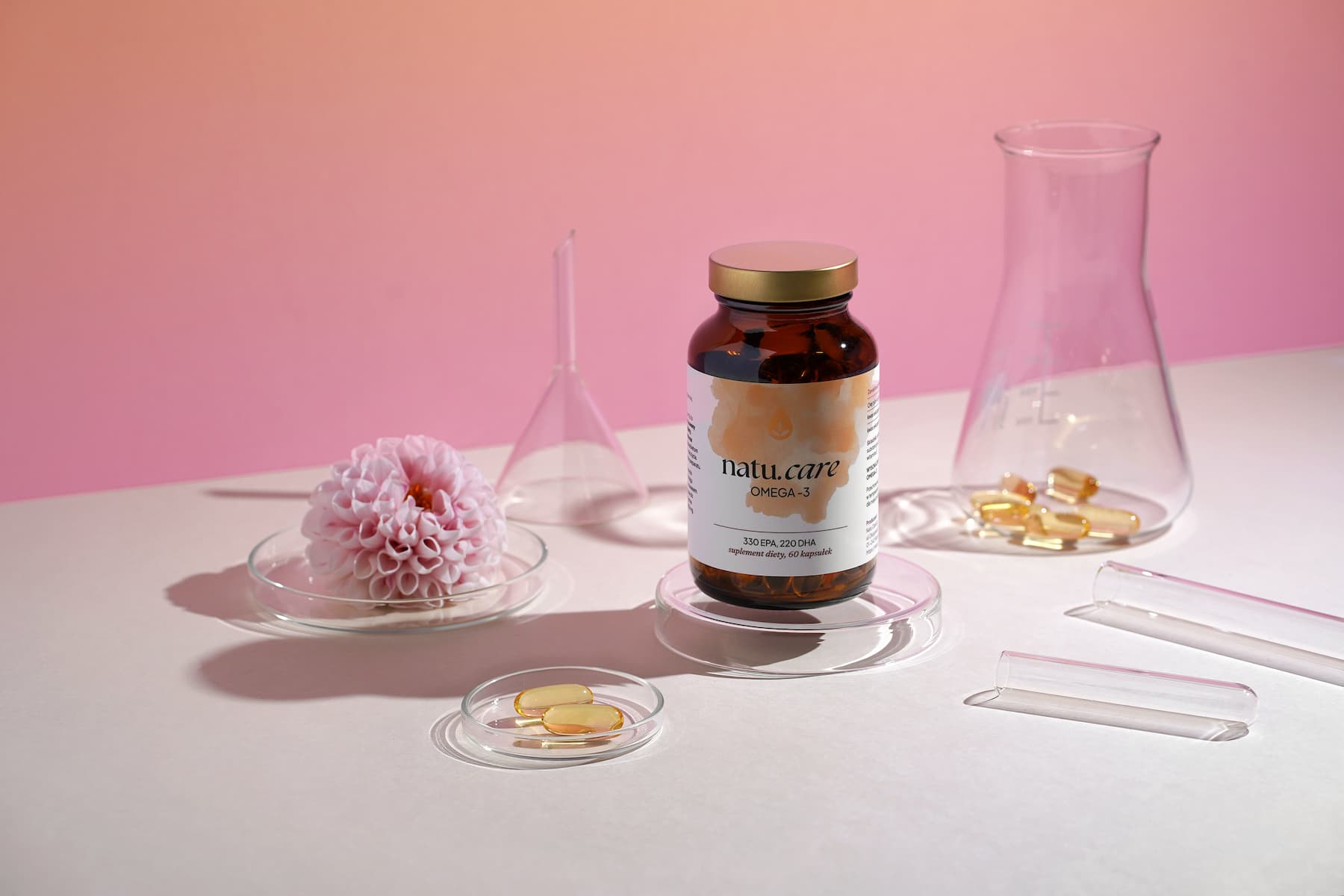
Omega-3 in a good dose and an optimum ratio of DHA and EPA acids will replenish valuable fats in the diet.
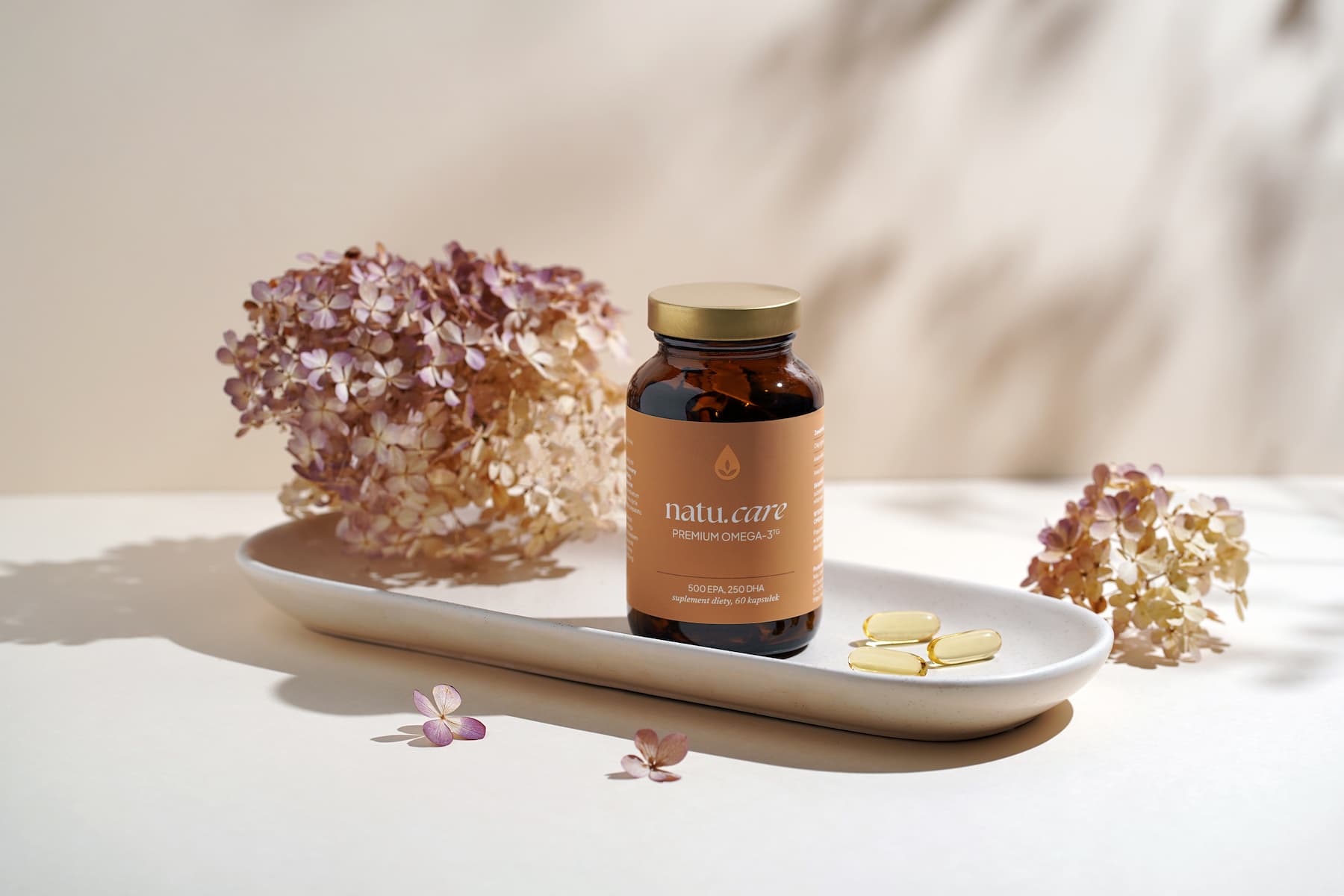
The omega-3 acids from Natu.Care are distinguished by their triglyceride form, which is characterised by high bioavailability.
